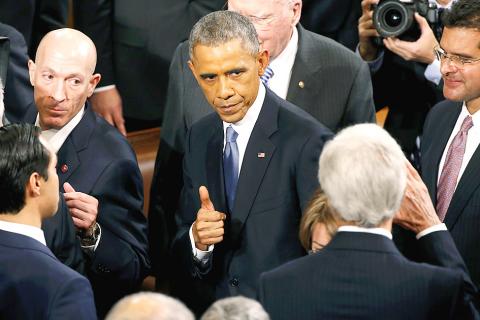US President Barack Obama on Tuesday declared that the US has turned the page on years of war and economic hardship, in a populist-tinged State of the Union address that set up the battle to succeed him, but Republicans quickly said the speech was more about politics than leadership.
Emboldened by a stronger economy and better approval ratings, Obama called for a new chapter in US history that ushers in a fairer economy with a better shake for the middle class.
“We are 15 years into this new century. Fifteen years that dawned with terror touching our shores; that unfolded with a new generation fighting two long and costly wars; that saw a vicious recession spread across our nation and the world,” Obama said. “It has been, and still is, a hard time for many, but tonight we turn the page.”

Photo: Reuters
He heralded the “growing economy, shrinking deficits, bustling industry and booming energy production” that have also helped revive his political fortunes as his time in the White House nears its end.
For six years Obama’s presidency was often subsumed by an economic crisis that stymied efforts to narrow inequality and put other liberal policy priorities on the back burner.
Appealing to Democrats determined to retain the White House next year, Obama on Tuesday called for an increase in the minimum wage, equal pay for women and tax breaks for the middle class.
Drawing a stark contrast with tax-averse Republicans, he dared his foes to oppose proposed tax increases for the rich that would pay for middle class breaks.
“We have risen from recession freer to write our own future than any other nation on Earth. It’s now up to us to choose who we want to be over the next 15 years and for decades to come,” he said. “Will we accept an economy where only a few of us do spectacularly well? Or will we commit ourselves to an economy that generates rising incomes and chances for everyone who makes the effort?”
Obama’s Republican opponents have branded such talk as little more than class warfare and will use their majority in both houses of US Congress to make sure the plans never become law.
Republican Senator Joni Ernst, who was tasked with rebutting Obama’s speech, said Americans are still suffering from “stagnant wages and lost jobs.”
She also decried Obama’s “failed policies” and a “stale mindset” that led to “political talking points, not serious solutions.”
Mitt Romney, a past and potential future Republican presidential candidate, said: “True to form, the president in his State of the Union speech is more interested in politics than in leadership.”
Obama also used the speech to call on the US Congress to authorize the use of force against the Islamic State group, formerly known as the Islamic State of Iraq and the Levant (ISIL).
“In Iraq and Syria, American leadership — including our military power — is stopping ISIL’s advance,” he said. “This effort will take time. It will require focus, but we will succeed.”
Just days after attacks in Paris killed 17, Obama said “deplorable anti-Semitism ... has resurfaced in certain parts of the world.”
“We stand united with people around the world who’ve been targeted by terrorists — from a school in Pakistan to the streets of Paris,” he said.

Taiwan is projected to lose a working-age population of about 6.67 million people in two waves of retirement in the coming years, as the nation confronts accelerating demographic decline and a shortage of younger workers to take their place, the Ministry of the Interior said. Taiwan experienced its largest baby boom between 1958 and 1966, when the population grew by 3.78 million, followed by a second surge of 2.89 million between 1976 and 1982, ministry data showed. In 2023, the first of those baby boom generations — those born in the late 1950s and early 1960s — began to enter retirement, triggering

One of two tropical depressions that formed off Taiwan yesterday morning could turn into a moderate typhoon by the weekend, the Central Weather Administration (CWA) said yesterday. Tropical Depression No. 21 formed at 8am about 1,850km off the southeast coast, CWA forecaster Lee Meng-hsuan (李孟軒) said. The weather system is expected to move northwest as it builds momentum, possibly intensifying this weekend into a typhoon, which would be called Mitag, Lee said. The radius of the storm is expected to reach almost 200km, she said. It is forecast to approach the southeast of Taiwan on Monday next week and pass through the Bashi Channel

NO CHANGE: The TRA makes clear that the US does not consider the status of Taiwan to have been determined by WWII-era documents, a former AIT deputy director said The American Institute in Taiwan’s (AIT) comments that World War-II era documents do not determine Taiwan’s political status accurately conveyed the US’ stance, the US Department of State said. An AIT spokesperson on Saturday said that a Chinese official mischaracterized World War II-era documents as stating that Taiwan was ceded to the China. The remarks from the US’ de facto embassy in Taiwan drew criticism from the Ma Ying-jeou Foundation, whose director said the comments put Taiwan in danger. The Chinese-language United Daily News yesterday reported that a US State Department spokesperson confirmed the AIT’s position. They added that the US would continue to

The number of Chinese spouses applying for dependent residency as well as long-term residency in Taiwan has decreased, the Mainland Affairs Council said yesterday, adding that the reduction of Chinese spouses staying or living in Taiwan is only one facet reflecting the general decrease in the number of people willing to get married in Taiwan. The number of Chinese spouses applying for dependent residency last year was 7,123, down by 2,931, or 29.15 percent, from the previous year. The same census showed that the number of Chinese spouses applying for long-term residency and receiving approval last year stood at 2,973, down 1,520,